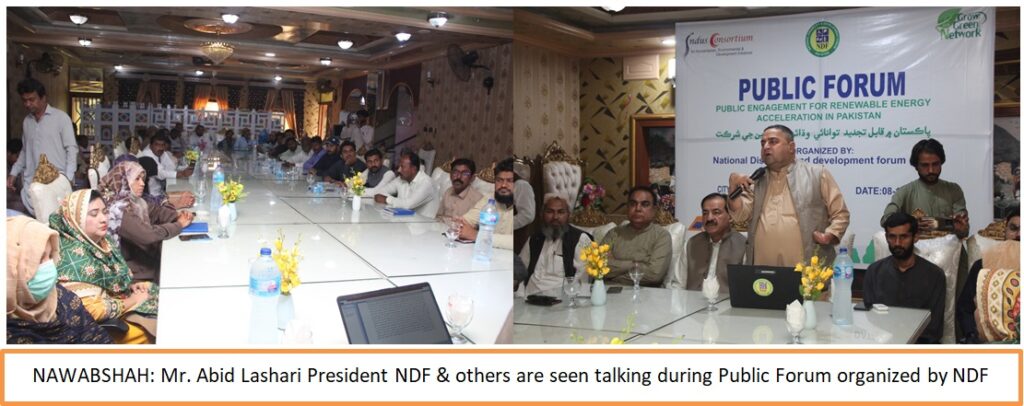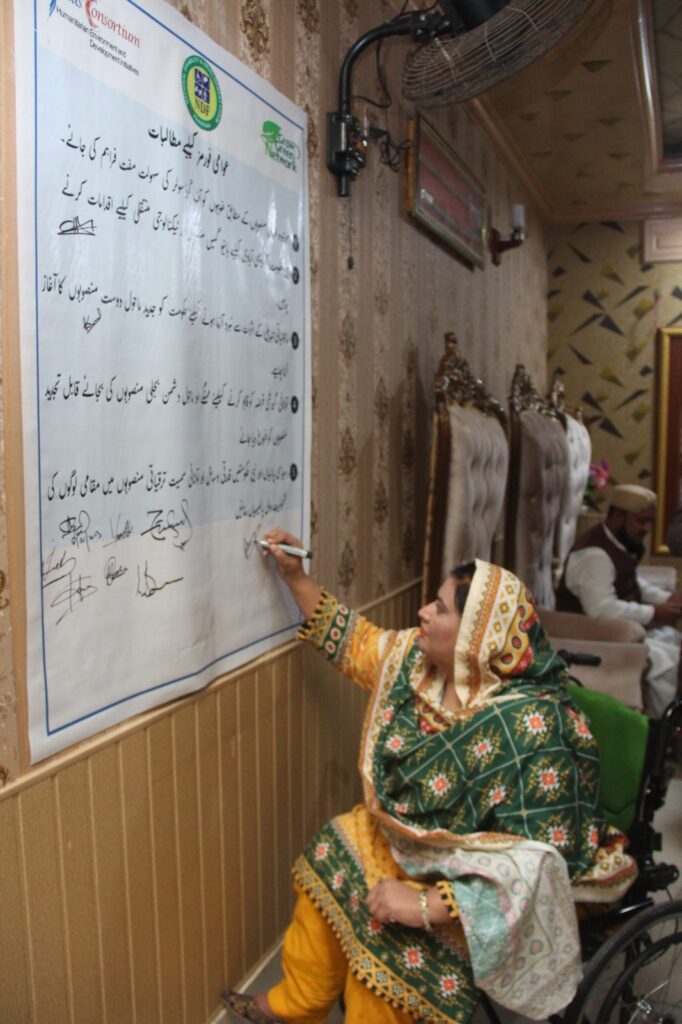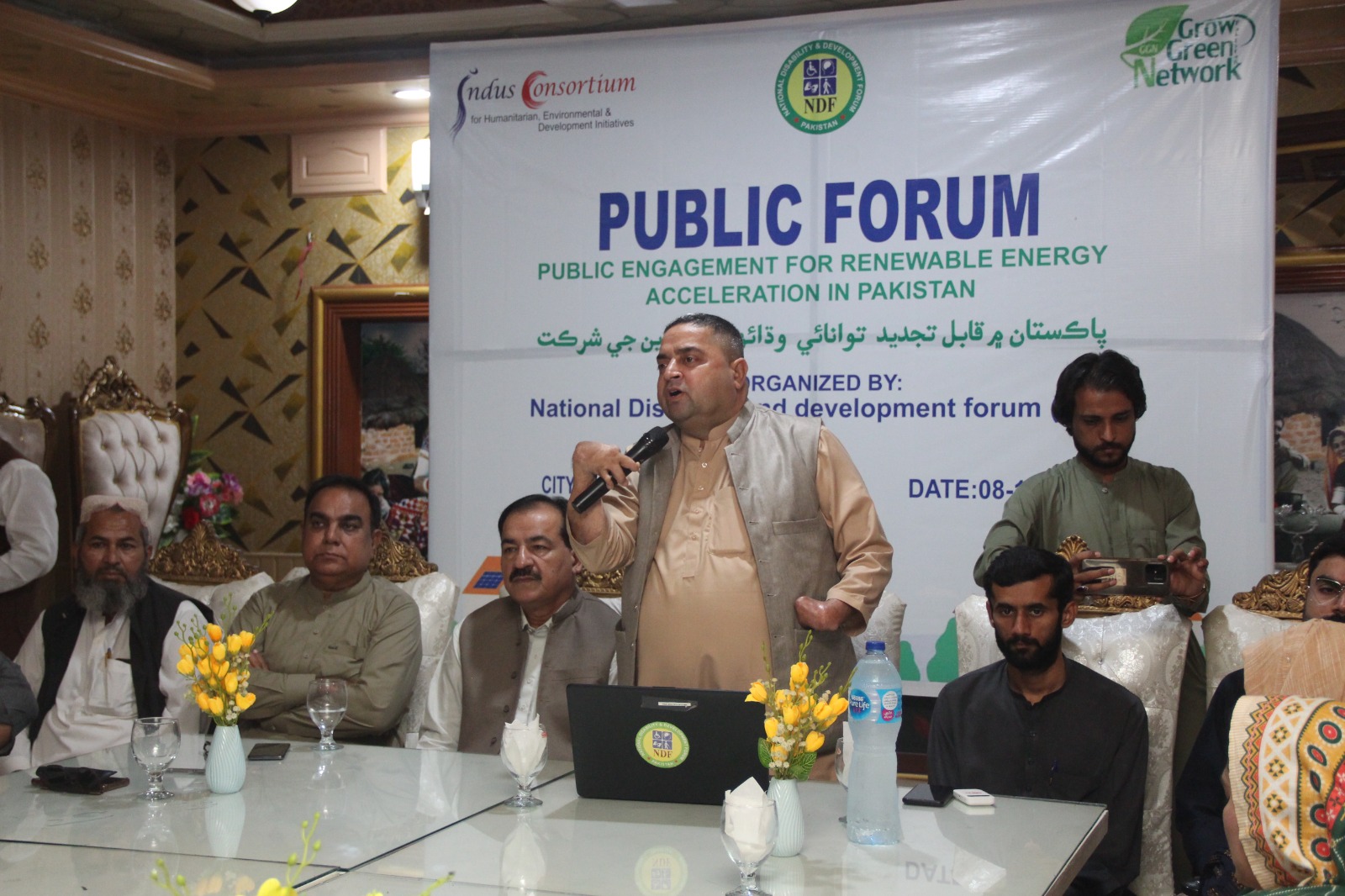NAWABSHAH: Grow Green Network, a group of 22 civil society organizations in Pakistan, has demanded that all the political parties work in harmony to resolve energy issues. In this regard, NDF Pakistan in collaboration of Indus Consortium conducted a Public Forum “Political Engagement for Renewable Energy Acceleration in Pakistan” on Wednesday at local Hotel, Nawabshah.
Representatives of political parties, academia, social activists, media and students participated in the forum. The purpose of the dialogue was to pursue political parties for the inclusion of clean energy demands in their public manifestos.

Mr. Abid Lashari President NDF, Mr. Gul Amin additional Director EPA (Environmental Protection Agency) Mr. Sabir Qureshi, Mr. Riaz Shar and others said that the country should not rely on fossil-fuel-based energy generation projects, instead, renewable energy projects should be identified and policies should be designed for the acceleration towards such projects.
According to the Pakistan Economic Survey 2022-23, Pakistan has 41,000 MW of installed electricity capacity, with thermal power plants accounting for 58.8% of this capacity, primarily reliant on imported fuels, making the country energy insecure.it was further said that the untargeted power sector subsidies, institutional constraints, and wrong policy directions have further burdened the economy with circular debt.
The solution lies in immediate energy reform, including institutional overhaul and reduced reliance on imported fossil fuels, shifting towards clean energy sources. The forum agreed that the major issues plaguing the energy sector include growing circular debt – already exceeding 4 trillion rupees, financial constraints leading to power shortages, reliance on imported resources, and an unbalanced energy generation mix. Moreover, Pakistan is the 8th most climate change-vulnerable nation.
Recent monsoons caused devastating floods with estimated damages and economic losses of over $30 billion. Despite being responsible for only 0.8% of global greenhouse gas emissions, Pakistan faces the adverse impacts of climate change, including heatwaves, droughts, heavy rainfall, and floods, leading to food insecurity, livelihood losses, and economic decline.
The dialogue demanded that Pakistan should pursue a climate-resilient development pathway to adapt to climate challenges. Reparations are vital for developing nations facing climate change issues, making it imperative for Pakistan to transition towards sustainable energy sources to address these pressing issues. The public forum demanded political parties support residential-scale off-grid solar PV projects in areas with limited connectivity, focusing on impoverished communities.

Link this scheme with existing State Bank of Pakistan’s RE incentives, ensuring equitable distribution through social welfare programs. Technology transfer programs should be introduced to promote Bagasse-based power projects in rural Pakistan. These initiatives can provide sustainable employment opportunities and clean energy sources, boosting community resilience.
Political parties embrace innovation in addressing climate change, including nature-based solutions like community-led afforestation. This can potentially earn “Carbon Credits” for Pakistan and stimulate economic activity in affected regions. The political parties should discourage further expansion of LNG terminals and promote clean energy alternatives to reduce environmental and financial costs and lower the carbon footprint.
Focus on enhancing mangrove cover along coastal regions by involving local fishing communities. The dialogue recommended the implementation of a ‘benefit sharing model for the community’ within policy frameworks. This model allows communities near renewable energy projects to share in revenue, fostering ownership and acceptance. Prioritise local community employment and capacity-building throughout the project lifecycle.
About Indus Consortium: Indus Consortium is an umbrella organization of 64 CSOs and academic institutions working for humanitarian, development and environmental initiatives. It aims to advocate Just Energy Transition as a community-centric model of growth for Pakistan through knowledge products, capacity building of grassroots communities, and outreach initiatives. The consortium is encouraging all political parties to integrate sustainable development and just energy transition goals into their election manifestos.


